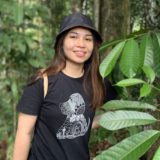
Amanda is a local Sabahan, native Kadazan, born in Kota Kinabalu and raised in Sandakan, Sabah. Ever since she was a kid, she viewed caretakers of animals as one of the most noble job with huge responsibilities. Watching wildlife documentaries and shows on Animal Planet, NatGeo and Discovery channel was one of her favourite things to do besides art and music. Thanks to her parents who nurtured these characters in their children at a very young age, Amanda pretty much grew up loving animals. That resonate into more than just loving them.
When it comes to wildlife, she didn’t believe she was cut out or brave enough to work closely with wild animals though Amanda always loved learning about conservation works no matter the species involved. She thinks growing up in Sandakan, The Nature City, did its part in teaching her why wildlife conservation matters. She’d like to believe she was moulded and groomed into this field, little by little. Amanda never really embraced her passion until she started enrolling for her undergraduate studies which exposed her to so much learning experience. She had the best time volunteering in animal shelters, participating in various activities from beach clean-ups, talks to wildlife events both in Kuching and Sandakan. Being able to work in different settings made her more adventurous and daring. She had her time working in the lab and on field though she felt more driven being on field.
During her undergraduate studies, she got the opportunity to venture into marine mammal conservation being involved with the Sarawak Dolphin Project (SDP) by the Institute of Biodiversity and Environmental Conservation (IBEC) in the Faculty of Resource Science and Technology (FRST) of Universiti Malaysia Sarawak (UNIMAS). She got to join in cetacean surveys done throughout 2018-2019 in Kuching. Despite spending hours doing boat surveys under the scorching sun, she had a humbling experience talking to the local fishermen, sharing information and at the same time spreading awareness to educate the locals. Whenever they had calls about stranded cetaceans, she had her time taking samples from dead, smelly carcasses too! Being with SDP was one of her most valuable moments. “Finally seeing the dolphins in the middle of the ocean on my last day of survey was exhilarating, it was too much of an emotion for me to explain, we thought that this was why we do what we do”, she said. In 2019, Amanda graduated with a Bachelor of Science Degree with Honours in Animal Resource Science and Management (Zoology) from Universiti Malaysia Sarawak (UNIMAS). That was the starting point of her journey in research.
Volunteering at the Bornean Sun Bear Conservation Centre (BSBCC) exposed her to so much in captive animal management. She has the utmost respect towards the staffs of the bear care unit who tend to the bears 24/7. “It was a heart-warming experience being surrounded by like-minded people because along this road, I started seeing the misconceptions people have towards loving wildlife and mother nature itself”, she said. Besides taking part in bear care tasks, rehabilitation and health check-ups, she enjoyed her time participating in the education outreach programmes. That’s when she realises that education plays a big role in spreading awareness. It goes hand-in-hand with conservation works and she felt that instilling these values in kids of young age is the best hope we have to build a better future for them.
Amanda is keen on ecological studies and aspire to become a wildlife conservation biologist one day. Besides research, she could see herself working with the local communities for conservation. She hopes more local youths will share the same compassion because she feels that the best people locals can turn to and carry the responsibility of caring for our biodiversity in the long run would be them. Volunteering at DGFC for two weeks made her realise the excitement of being in the field. She loves being able to see the project and people grow, and seeing things live through her own eyes. “I felt most in my element there”, she said. When she was offered a chance to take up a project, she knew it was an opportunity to sharpen her skills and knowledge in wildlife research. Hence, right now, Amanda is pursuing her MSc studies with the Institute for Tropical Biology and Conservation (ITBC) in Universiti Malaysia Sabah (UMS) while currently working as a researcher leading the leopard cat project which is part of the Bornean Carnivore Conservation Project. The project is also in line with the Health at the Edge Project.
She believes conservation effort should not be limited to endangered species only. “Often times people start to care only when it’s too late”, she said. She believes that starting this project has also allowed her to embark on her own journey of self-discovery. With the project currently moving forward, they are hoping that it will contribute vital information to other stakeholders on leopard cat ecology and implore other people/organizations to work together in managing wildlife population in other landscapes as well. Plus, with the recent Covid-19 pandemic, they believe that native species such as the leopard cat which are known to house the novel coronavirus are believed to be one of the focal species for further researches to be done especially on zoonotic diseases.
Education:
BSc (with Hons) in Animal Resource Science and Management (Zoology) – 2016 – 2018 – Universiti Malaysia Sarawak (UNIMAS) – Thesis title: Survey and Nutritional Analyses of small cetacean diet in Kuching Bay, Sarawak
